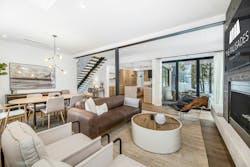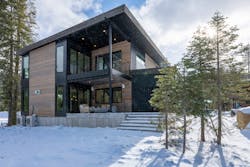Over the last several years, prefabricated construction has been steadily gaining traction as an efficient and sustainable way to build beautiful homes. The method appealed to Steve Glenn, founder and chief executive officer of Plant Prefab in Rialto, Calif. Glenn founded Plant Prefab in 2016 and the company has since grown into a leading designer and builder of high-quality, healthy, sustainable and custom-built single- and multifamily homes.
“Plant was founded to make it faster and easier to build high-quality, sustainable, architectural homes,” said Glenn. “To achieve this, we designed and patented our own hybrid prefabrication methodology, the Plant Building System™, which combines the time, quality, and cost advantages of modular construction with the design flexibility and expanded site access capabilities of panelized construction. Clients get an extremely durable and energy-efficient home, built to precision manufacturing standards, delivered 20% to 50% faster and with up to 30% less waste than traditional, site-based construction.”
The Prefabricated Approach
As a prefabricated builder specializing in custom homes and known for collaborating with a range of architects with unique styles, Plant Prefab puts design first and building method second. As a result, most of their homes end up using wood or steel framing to best accommodate the architects’ plans. With this process, tight building envelopes and high-performing materials and systems are also prioritized to keep the quality of performance on par with design.
Partnerships are Born
There’s one commonality in every home created by Plant Prefab: sustainability. Their patented Plant Building System has revolutionized prefabrication technology and helped them achieve a 30 percent reduction in waste. They also recently became the first custom prefabricated and panelized homebuilder to achieve B Corporation certification.
With sustainability at top of mind, it was important to Glenn and his team to partner with architects, suppliers and other building partners who shared their values and supported their social and environmental goals. The relationship with Mitsubishi Electric is a natural fit.
“Because Plant Prefab is a certified B Corporation, we knew they’d have high standards for social and environmental performance and would prioritize fulfilling sustainability efforts,” said Ken Johnson, senior manager of performance construction, Mitsubishi Electric Trane HVAC US. “The decision to work together just highlights how much our companies’ values align, as well as our mutual commitment to investing time and resources into sustainable building.”
In 2019, Plant Prefab committed to full carbon neutrality in their operations by 2028. This goal, combined with the ever-increasing number of homeowners and builders looking to lower their carbon footprint by moving away from traditional fossil fuel-burning systems, made selecting energy-efficient, sustainable heating and air-conditioning equipment all the more important. In an increasing number of Plant Prefab’s projects, Mitsubishi Electric mini-split and heat pump air-conditioning systems offer the answer.
“We love collaborating with builders like Plant Prefab who are committed to sustainability and helping them choose the optimal system for each of their unique and beautiful projects,” added Johnson.
Selecting the Right System
Because Plant Prefab homes are constructed offsite, ductless systems from Mitsubishi Electric have made on-site assembly much easier. The EZ FIT® Recessed Ceiling Cassette is popular for its easy installation, simplified maintenance and attractive design. Other homes, including Plant Prefab’s accessory dwelling units use Designer Series Wall-mounted Indoor Units for their sleek aesthetic appeal.
The ideal system for each Plant Prefab home is typically determined with input from Mitsubishi Electric and insight from engineering teams who help calculate heating and cooling loads and integrate heating and air-conditioning systems with ventilation and other home systems to ensure year-round comfort.
“As a custom builder, we prefabricate homes for all climates, from desert to alpine,” explained Glenn. “The flexible design of our Plant Panels™ and Plant Modules™ allow us to custom-tailor the prefabrication of every project to its unique requirements. Plant Panel design is regionally code-driven by air, water and heat transfer analysis, coupled with local structural and seismic requirements, ensuring optimal thermal performance and durability for the specific local climate.”
Mitsubishi Electric units equipped with Hyper-Heating INVERTER® (H2i®) technology are able to perform at 100 percent of rated heating capacity in outdoor ambient temperatures as low as 5° F, with continued operation down to -13° F. Select units from Mitsubishi Electric are also available with H2i plus™ technology, providing 100 percent performance down to -5° F. Plant Prefab homeowners can rest assured they won’t be sacrificing comfort to live sustainably.
Responding to Demand
Currently, the U.S. housing market is experiencing soaring home prices, and a significant undersupply, which Forbes estimates at 2.5 million homes. But a third trend that can’t be overlooked is the growing number of homebuyers who want healthy and sustainable homes.
Prefabricated builders are perfectly positioned to provide the solution. By condensing the build cycle and by providing energy-efficient homes, offsite construction can address the housing shortfall and attain sustainability goals. Plant Prefab homes frequently meet energy certifications such as ENERGY STAR® and qualify for the Department of Energy’s Zero Energy Ready Home Program. In fact, they designed the first home to achieve LEED® for Homes Platinum certification and just introduced a line of Passive House standard home designs.
While prefabricated homes still represent a small piece of the market, with Plant Prefab’s sustainably built and architecturally striking designs, it’s a choice many buyers are finding increasingly attractive.
Read the full case study here: https://mehvac-blog.com/all-electric-heating-and-air-conditioning-systems-prove-ideal-for-california-based-prefabricated-home-builder

